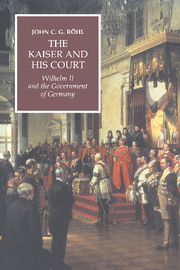Book contents
- Frontmatter
- Dedication
- Content
- Preface to the English edition
- Introduction
- 1 Kaiser Wilhelm II: a suitable case for treatment?
- 2 Philipp Eulenburg, the Kaiser's best friend
- 3 The Kaiser's court
- 4 The ‘kingship mechanism’ in the Kaiserreich
- 5 Higher civil servants in Wilhelmine Germany
- 6 The splendour and impotence of the German diplomatic service
- 7 Dress rehearsal in December: military decision-making in Germany on the eve of the First World War
- 8 Kaiser Wilhelm II and German anti-semitism
- Notes
- Index
3 - The Kaiser's court
Published online by Cambridge University Press: 05 October 2015
- Frontmatter
- Dedication
- Content
- Preface to the English edition
- Introduction
- 1 Kaiser Wilhelm II: a suitable case for treatment?
- 2 Philipp Eulenburg, the Kaiser's best friend
- 3 The Kaiser's court
- 4 The ‘kingship mechanism’ in the Kaiserreich
- 5 Higher civil servants in Wilhelmine Germany
- 6 The splendour and impotence of the German diplomatic service
- 7 Dress rehearsal in December: military decision-making in Germany on the eve of the First World War
- 8 Kaiser Wilhelm II and German anti-semitism
- Notes
- Index
Summary
As Germany under Kaiser Wilhelm II approached the apogee of its industrialisation, there simultaneously occurred a ‘monstrous’ blossoming of a court culture of a kind not seen before in the whole of its history. Whether they enthused over the ‘splendour of the Crown’ in that ‘magnificent imperial epoch’, or alternatively complained about the ‘bombastic character, the showy glitter and ostentation’ of this phenomenon, contemporaries were united in their view that, alongside its rise to preeminence as an industrialised Great Power, alongside the universally admired organisation of its state and military institutions, the Wilhelmine Reich was characterised by the efflorescence of a sumptuous neo-absolutist court culture. Yet this key aspect of German history has until recently barely been touched upon by historians of the period.
The reasons for this neglect can be indicated only briefly here. After both 1918 and 1945 there were weighty political motives behind the attempts to trivialise the role of the Kaiser and of his court. During the Weimar Republic the historical profession was preoccupied by the war guilt question and by the trauma of 1918. To the historians of the time, who were almost without exception of a ‘patriotic’ disposition, it seemed wiser, for reasons both of domestic and of foreign policy, to concentrate on Frederick the Great and Bismarck as formative historical influences and to pass over in silence not only the widespread aspirations to ‘world power’ but also the absolutist speeches and marginalia of Wilhelm II, the scandal-ridden court society and the gradual corruption of the old Prussian civil service and officer corps by the Byzantinism of the Kaiser's court. To this ‘national’ historiographical tendency was added after 1945 a new preoccupation with the southern, Catholic tradition, and with the liberal and social democratic impulses of the German past, and these needless to say also distracted attention from the Hohenzollern court. Those historians who did concern themselves with the state organs of the Kaiserreich were inclined to paint a one-sidedly bureaucratic or legalistic picture. A preference was shown for the history of official institutions and of the constitution, politics was confused with administration, the written constitution with constitutional reality, the political structure of the Reich - even after Bismarck's fall from power - was seen as a hierarchy of officialdom headed by the Reich Chancellor.
- Type
- Chapter
- Information
- The Kaiser and his CourtWilhelm II and the Government of Germany, pp. 70 - 106Publisher: Cambridge University PressPrint publication year: 1994



